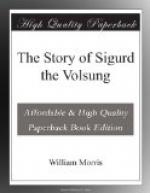Guest-fain, hospitable, ready to welcome guests.
Guile, cunning, cleverness used for an evil purpose.
Guise, appearance, kind, dress, e.g. “such was the guise of his raiment;” “fair-clad in hunter’s guise.”
Halers of the hawsers, pullers of the ropes, i.e. seamen.
Hallow, to set apart for a solemn purpose, to make holy, e.g. I hallow me to Odin for a leader of his host.
Hangings, tapestry, woven stuff on which pictures or figures of gods and heroes were embroidered, used to decorate the walls of houses, e.g. “The walls were strange and wondrous with noble stories told;” “the gods on the hangings stirred.”
Harness, armour.
Hauberk, a breast-plate.
Heave, to rise and fall, sometimes merely to rise, e.g. “The doom ... heaves up dim through the gloom.”
High-seat, the dais or chief seat where the master of a house and his principal guests sat.
High-tide, time of festival.
Hindfell, the word means “deer-mountain,” since “fell” means any hill, and “hind” is the word we still use for a deer.
Hireling, a servant.
Hist, to give attention, to listen.
Hithermost, nearest.
Hoard, a store. Generally used of a treasure which the owner keeps selfishly, e.g. Fafnir’s wisdom is called “grudged and hoarded wisdom,” and his gold the “heavy hoard.”
Hoenir, one of Odin’s sons; a wise and blameless god who, the others believed, would return to reign over a new heaven and a new earth when Ragnarok was past.
Holt, a woodland.
Hoppled, fettered.
Horse-fed, cropped by horses.
Horse-herd, keeper of horses. “Herd” means any keeper of animals, and is generally joined with other words, e.g. shepherd, swine-herd.
Huddled, twisted together in a small space.
Intent, intention, purpose. In the passage, “For whom is the blood-point whetted and the edge of thine intent?” the meaning is, “Against whom is thy sword sharpened, and against whom is thy purpose so keen?”
Kin, family, relations. Kin of the Wolf, Loki and his children, one of whom was a monstrous wolf which was to fight against the gods at Ragnarok.
Kine, cattle.
Kirtle, a long cloak.
Lack, loss, e.g. “He knew there was ruin and lack.” “The lack that made him loth” is used to describe the ring of Andvari which he was unwilling to give up with the rest of his treasure to Loki. n. “To be without,” or, “to be found wanting.”
Lay, a song.
Lea, a meadow.
Leeches, doctors.
Lief, willing.




